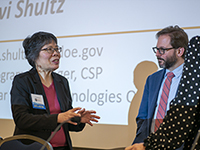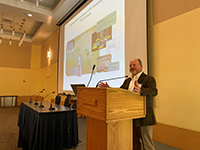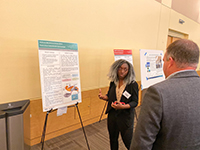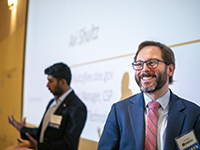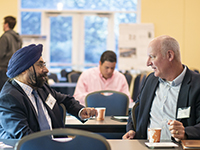- Home
- »
- Research
- »
- Centers and Programs
- »
- Industrial Decarbonization Solutions Hub
- »
- Solar Thermal Symposium
Solar Thermal Symposium
November 15, 2019
As California and the world seek to reduce their carbon intensity, what would it take for solar thermal technologies to deliver a cost-effective low-carbon supplemental source of energy for industrial processes? UC Davis and UC Merced hosted a 1-day symposium that brought together representatives from R&D agencies, research institutions, and industry to identify promising solutions that could generate significant commercial impact. A summary of the symposium and key takeaways can be found here.
9:00am: Introductory Session
Welcome/Setting the stage
California goals and challenges to meet them – Virginia Lew (CEC) View Presentation
Industrial processes needing high temperatures: An Overview – Vinod Narayanan (UC Davis) View Presentation
Types of solar collectors and temperatures they can reach: An Overview – Roland Winston (UC Merced) View Presentation
Opportunities for solar thermal to provide heat for industrial applications –Avi Shultz (DOE) View Presentation
Discussion
11:00am: Opportunities for using Solar Thermal in Industrial Applications to Produce Medium and Higher Pressure Steam Generation
Requirements for replacing natural gas for food processing – Thomas Maulhardt (Campbell Soup) View Presentation
Lessons learned from solar thermal in upstream oil-gas facility – Stanleigh Cross (Chevron)
An 850 MW solar thermal project: when solar thermal can replace natural gas – John O’Donnell (Glasspoint) View Presentation
New Ideas for the Design and Construction of Collectors for Industrial Solar Boilers – Nicolas Peralta (Sunvapor)
Discussion
12:30pm: Lunch and Poster Session
Continuity of Thermal Processing Power through Energy Storage Materials
2:30pm: Opportunities for using Solar Thermal in Industrial Applications to Provide Heat for Driving Chemical Processes
Applications for solar thermal for industrial processes – Parthiv Kurup (NREL) View Presentation
Pathways to hydrogen production using solar heat – Anthony McDaniel (SNL) View Presentation
Lessons learned commercializing an emerging solar thermal technology – John King (Hyperlight Energy Solar)
Discussion
4:20pm: Panel discussion: Bringing it all together
Moderator: Mary Werner (NREL)
Panelists:
Brian Borak (ARPA E)
Trevor Demayo (Chevron)
Lun Jiang (UC Merced)
• What are the best strategies for meeting the needs of industrial processes? What would it take for solar thermal to satisfy these needs? What’s needed to bring down cost?
• When will solar thermal have an advantage over other energy sources?
• Where are the technical opportunities?
• What policies would be needed to help start this market? Why aren’t people taking advantage of the current opportunities?

